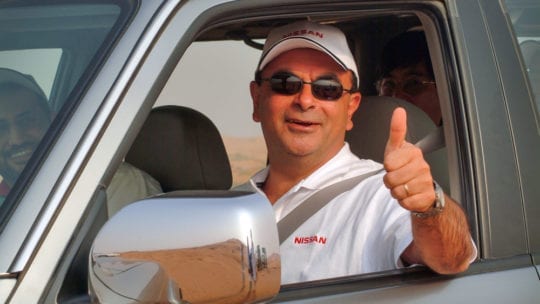
Your executive is a legend in the auto business. He was chairman of Nissan and Mitsubishi Motors. At Renault he remains CEO and chairman, despite residing in a Tokyo jail cell since just before Thanksgiving. That’s when authorities hauled him off his private jet.
He's been in a jail cell since then. Authorities filed charges weeks later, on Dec. 10. For years he failed to report tens of millions of dollars in income, police say.
Next week the executive we’re describing, Carlos Ghosn, will make a public appearance for the first time since his detention. Appearing in a Japanese district court, he'll seek an explanation for his continued detention. Apparently Japanese authorities are building a larger case against him, though this is speculation. His prolonged wait before receiving charges has put Japan's legal system under scrutiny.
You’re his PR person. What do you advise him, or any CEO in hot water, to say, if anything?
Legal and PR
Of course, Ghosn's situation is more than a PR crisis, it’s also a legal thicket. It's unclear that Ghosn can make a statement outside of what he says in court. Should he be permitted to speak, any statements he makes "will have to be aligned with his legal counsel to ensure court proceedings are not adversely impacted," says Meredith L. Eaton, director, N. America, for Red Lorry Yellow Lorry.
For the CEO who’s addressing a pure PR crisis, though, authenticity is key, says Hinda Mitchell, president of the Inspire PR Group. “Be genuine, openly acknowledge that the crisis occurred, admit mistakes, if they occurred.”
Business as Usual. Not.
The last thing a CEO wants to do in a first public appearance since a crisis erupted is act as if nothing happened. "We often see executives and leaders try to resume ‘business as usual,’ but the crisis will follow them until a resolution has been reached," Eaton adds.
T.J. Winick, SVP, Solomon McCown & Company, urges contrition. "Apologize...a genuine 'I’m sorry'...can go a long way toward restoring a brand’s image. An apology is not an admission of guilt, but it does demonstrate humility and accountability."
Eaton emphasizes the tenor of the apology. "CEOs would do well to...offer comfort or sympathy, as appropriate," she says. Leaders "need to also think beyond themselves when addressing the public for the first time." The "trickle-down effect" of what the CEO says, and how it's said, on a brand's employees, investors and affiliates can be big, Eaton adds.
Up Ahead
The traditional crisis-response protocol is recommended once the apology is made. “Be prepared to clearly define what measures are in progress to address the crisis, including changes in policy, disciplinary procedures, or other corrective actions,” says Mitchell.
Adds Winick, "Define the path forward. What will the CEO or the company do differently to avoid a similar situation from reoccurring?" He adds such a plan should include "tangible steps that demonstrate transparency and that the leader is holding themselves responsible for instituting real change."
Other Tips
Own the Mistake: "Too often, CEOs don’t take ownership for a crisis, whether of their own making or their company’s," Winick says. "Protecting the brand’s reputation starts at the top. To successfully weather a PR storm leaders must accept responsibility."
Stay in Your Lane: "If it’s early in the crisis, only share what is known at the time–don’t speculate or respond to speculation from others," Mitchell says. "Above all, keep people looking at you to define the crisis–don’t let others do it for you."
Seth Arenstein is editor of PR News. Follow Seth: @skarenstein
